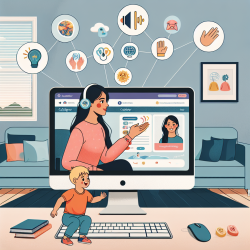The recent study, "Supporting Caregivers Remotely During a Pandemic: Comparison of WHO Caregiver Skills Training Delivered Online Versus in Person in Public Health Settings in Italy," provides valuable insights into the feasibility, acceptability, and effectiveness of delivering caregiver skills training (CST) online. As a practitioner dedicated to creating great outcomes for children, understanding these findings can help you refine your approach and better support the families you work with.
Key Findings and Implications
The study highlights several important outcomes:
- Feasibility: Online CST was delivered with high levels of integrity, though some technological issues were noted. Practitioners should ensure families have access to reliable internet and devices to maximize the effectiveness of remote sessions.
- Acceptability: While online CST was generally well-received, some caregivers reported feeling emotionally distant. Facilitators can enhance engagement by incorporating more interactive elements and providing additional support to families struggling with the remote format.
- Effectiveness: Both online and in-person CST significantly improved caregiver competence compared to treatment as usual. This underscores the potential of telehealth as a viable alternative when in-person sessions are not possible.
Practical Tips for Implementing Online CST
Based on the study's findings, here are some practical tips to improve your online CST sessions:
- Ensure Technological Preparedness: Verify that families have the necessary technology and internet connectivity. Consider providing technical support or resources to help them set up their devices.
- Foster Engagement: Use interactive activities and encourage participation to combat feelings of emotional distance. Virtual breakout rooms can facilitate smaller group discussions and personalized feedback.
- Blend Delivery Modes: A hybrid approach, combining initial in-person visits with subsequent online sessions, can help build rapport and ensure a thorough understanding of the child's needs.
- Provide Flexibility: Offer flexible scheduling options to accommodate caregivers' varying responsibilities and time constraints.
- Utilize Video Feedback: Incorporate video reviews of caregiver-child interactions to provide concrete, personalized feedback that can enhance learning and application of skills.
Encouraging Further Research
While this study provides a strong foundation, further research is essential to refine online CST methods and explore long-term outcomes. Practitioners are encouraged to contribute to this growing body of knowledge by sharing their experiences and findings from implementing remote interventions.
To read the original research paper, please follow this link: Supporting Caregivers Remotely During a Pandemic: Comparison of WHO Caregiver Skills Training Delivered Online Versus in Person in Public Health Settings in Italy.










